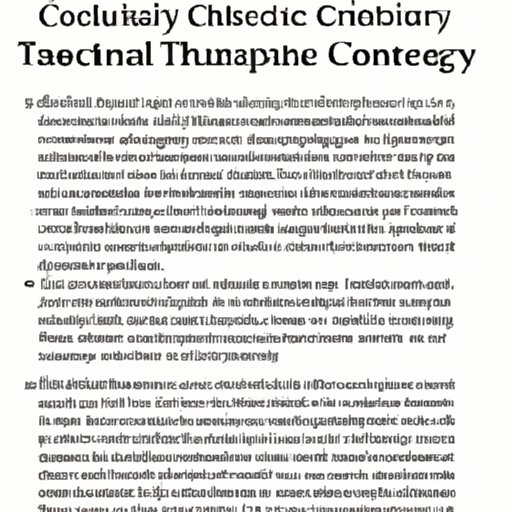Introduction
Cultural theory is a field of study that has been gaining recognition in recent years. It is an interdisciplinary approach that examines how culture influences our beliefs, values, and behaviors. This article will explore the origin and evolution of cultural theory, define what it is and its impact on society, examine how it relates to other disciplines, and investigate the intersections of cultural theory and popular culture.

Exploring the Origin and Evolution of Cultural Theory
Cultural theory has its roots in the 19th century, when anthropologists began to study the customs and traditions of different cultures around the world. Since then, the field has evolved to encompass a wide range of topics, such as media studies, sociology, psychology, and linguistics. In the late 20th century, cultural theorists began to explore how culture shapes our identities and experiences.
Today, cultural theory is a vibrant and dynamic field of study. It encompasses a range of perspectives, from postmodernism to feminism, and draws from a variety of disciplines. It is used to analyze and interpret everything from literature and art to technology and politics.
Defining Cultural Theory and its Impact on Society
Cultural theory is a broad term that encompasses many different approaches and theories. At its core, it is concerned with understanding how culture shapes our lives and the world around us. It examines how our beliefs, values, and behaviors are influenced by the culture we live in.
Cultural theory also looks at the ways in which culture is produced and reproduced, and how this affects society. By examining the power dynamics and social structures that shape our lives, cultural theorists can gain insight into the forces that drive social change. Furthermore, cultural theory can be used to challenge oppressive systems and ideologies, and to promote social justice.

Examining How Cultural Theory Relates to Other Disciplines
Cultural theory is closely related to other disciplines, such as anthropology, sociology, and media studies. These fields all share a focus on understanding culture and its effects on society. However, they each take a unique approach to examining culture and its influence.
For example, anthropology is concerned with studying human societies and cultures, while sociology focuses on the structure and organization of social groups. Media studies, meanwhile, looks at the role that media plays in shaping our beliefs and behaviors.

Analyzing Key Concepts in Cultural Theory
Cultural theory is based on several key concepts, including identity, power, and agency. Identity refers to the way we view ourselves and our place in society. Power is the ability to control or influence others, and agency is the capacity to make choices and take action.
In addition, cultural theorists often focus on the concept of hegemony, which refers to the dominance of certain ideas or values over others. Hegemony is often seen as a form of domination, where one group’s interests are privileged over another’s.
Understanding the Role of Culture in Society Today
Cultural theory can help us understand the role that culture plays in society today. It can provide insight into how our beliefs, values, and behaviors are shaped by the culture we live in. It can also help us to recognize the power dynamics and social structures that exist in our society, and how these can be challenged and changed.
Furthermore, cultural theory can be used to examine how new technologies, such as the internet and social media, are impacting our lives. By looking at how these technologies are changing the way we interact with each other and the world around us, we can gain a better understanding of their implications for society.
Investigating the Intersections of Cultural Theory and Popular Culture
Cultural theory can also be used to examine the connections between popular culture and broader social issues. For example, by looking at how certain films or television shows portray gender roles, we can gain insight into how these ideas are perpetuated in society. Similarly, by looking at how music reflects or challenges certain societal norms, we can gain a better understanding of how culture influences our beliefs and behaviors.
In addition, cultural theory can be used to explore the influence of technology on culture. By examining how new technologies are impacting our lives, we can gain a better understanding of the potential implications for society.
Conclusion
In conclusion, cultural theory is an interdisciplinary approach that examines how culture influences our beliefs, values, and behaviors. It has its roots in the 19th century, but has since evolved to encompass a wide range of perspectives. Cultural theory is closely related to other disciplines, such as anthropology, sociology, and media studies, and focuses on key concepts such as identity, power, and agency. Finally, it can be used to examine the intersections of culture and popular culture, as well as the influence of technology on culture.
This article has explored the origin and evolution of cultural theory, its impact on society, its relation to other disciplines, and how it intersects with popular culture. By understanding how culture shapes our lives, we can gain insight into the power dynamics and social structures that exist in our society, and how these can be challenged and changed.
(Note: Is this article not meeting your expectations? Do you have knowledge or insights to share? Unlock new opportunities and expand your reach by joining our authors team. Click Registration to join us and share your expertise with our readers.)
